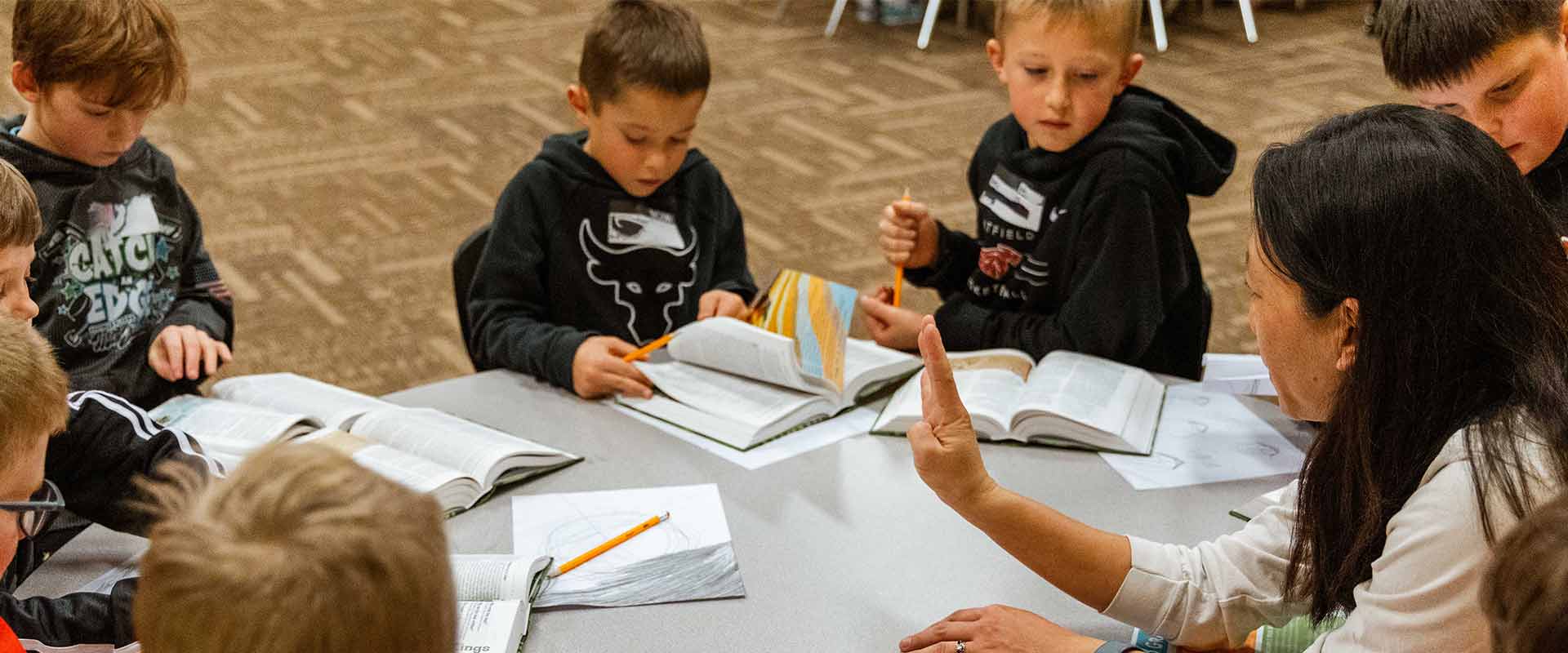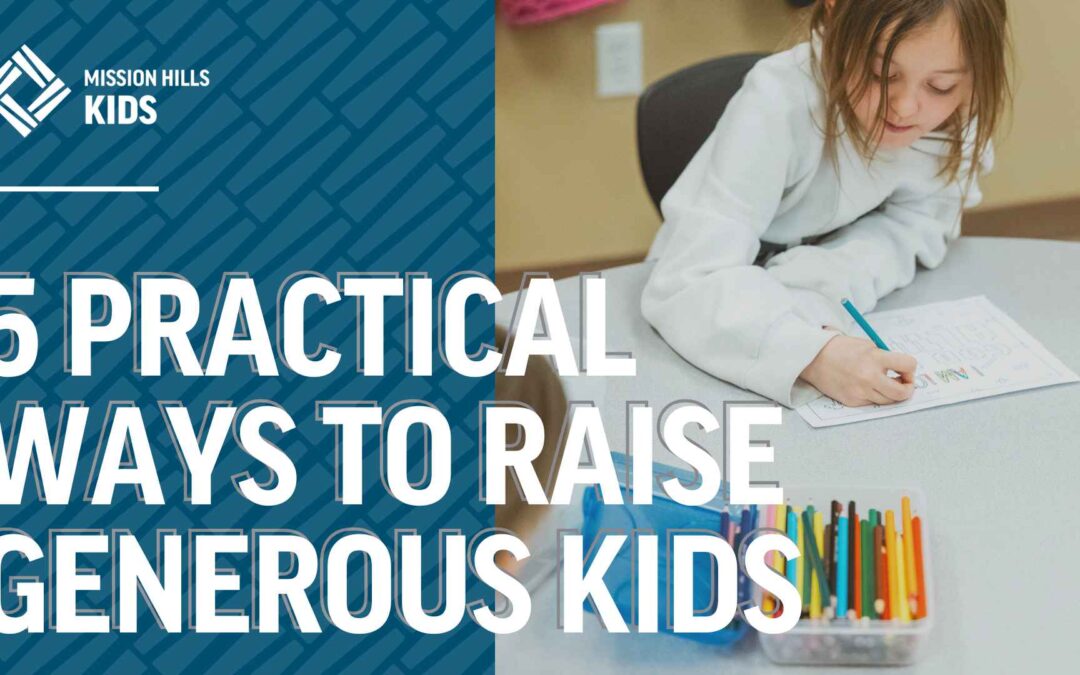I’ll never forget my son’s best friend when he was in preschool. He was one of the most generous kids I’ve ever known at such a young age.
After a playdate with this family, my son would routinely come home with at least one cool toy to borrow until our next get-together. His friend would practically insist he borrow his toys. He was a model of kindness, generosity, and serving others by sharing what he had.
As parents, we long for our children to follow 2 Corinthians 9:7 – “Each of you should give what you have decided in your heart to give, not reluctantly or under compulsion, for God loves a cheerful giver.” How can we encourage that kind of genuine generosity in the next generation?
Kids by nature, especially when young, are hard-wired to be self-centered and a bit selfish. It’s honestly God-designed to ensure their very survival. However, as children age and mature, they develop the capacity to be aware of the needs and feelings of those around them.
As parents, we have a unique opportunity to guide and develop a child’s innate ability for thoughtfulness and charity towards others. Here are five practical ways to nurture generosity in kids today.
1. TEACH EMPATHY
Generosity starts with realizing how others feel. In day-to-day life interactions, we can help our kids identify emotions and notice how their behavior impacts friends and family.
Even with toddlers, we can ask, “How do you think your sister felt when you shared (or didn’t share) your dolls with her?” Once a sibling spat has been resolved, consider talking briefly with each child about how the other party may have felt. Understanding another’s perspective, especially when they don’t agree with it, can help kids develop compassion.
When reading a story or watching a show, discuss how certain situations may have made the characters feel. These simple conversations plant seeds of empathy that eventually blossom into genuine generosity.
2. MODEL GENEROSITY
As the adage goes, “people don’t do what you say, they do what you do.” Kids are naturally great imitators, so we have a prime opportunity to lead by example.
How you choose to spend your time and money can speak volumes to your kids. Be sure to include your children in family discussions about causes you choose to support. Studies show that when children know why their parents give, they are up to 20% more likely to do the same.
Remember that generosity doesn’t always have to involve money. Model it in your actions toward others by:
-
- Helping someone without being asked
- Being kind to someone after they’ve made a mistake
- Offering forgiveness freely
- Speaking words of encouragement to strangers
- Letting someone go ahead of you in line
When your children see you living generously in everyday moments, they’re more likely to adopt these behaviors themselves.
3. CREATE FAMILY GIVING TRADITIONS
Donating time as a family can be a great way to model generosity and create fun family traditions your kids will long remember.
Consider:
-
- An annual holiday ritual of filling shoeboxes for Operation Christmas Child (where each child gets to bless a kid in their own age bracket)
- A short-term family mission trip every few years that could become a treasured vacation
- Regular visits to nursing homes or children’s hospitals
- Seasonal clothing or toy drives where your kids donate things they’ve outgrown
- When you are shopping with your kids throughout the year, buy one or two extra nonperishable items at a time that you place in a special box in your garage. When the box is full, make a family trip to donate it to a shelter.
These shared experiences of giving create lasting memories and reinforce the joy that comes from generosity.

4. PROVIDE STRUCTURED OPPORTUNITIES TO GIVE
For children to truly embrace generosity, they need regular, structured opportunities to practice giving. This helps them develop habits that will last a lifetime.
If your children earn allowances, begin a Give/Save/Spend system with percentages to place in each envelope or jar. Once they’ve earned a preset amount in the Give portion, let them choose where to donate the money. This gives them ownership over their giving and helps them see the impact they can make.
Other options include having kids:
-
- Set aside a portion of birthday or holiday money for charitable giving
- Create homemade gifts for teachers, neighbors, or family members
- Participate in community service projects appropriate for their age
5. CELEBRATE ACTS OF GENEROSITY
All kids naturally demonstrate generous actions from time to time. When you witness one, be sure to praise it, whether your child is the recipient of it or the one who performed it.
Positive reinforcement helps kids connect giving with positive feelings. When you notice your child sharing without being prompted or showing concern for someone else, acknowledge it specifically: “I noticed how you shared your snack with your friend today. That was so generous of you, and I bet it made them feel special.”
Random acts of kindness also demonstrate generosity. Consider painting rocks with kind or inspirational sayings and leaving them along your walking route to perk up another’s day. Or write fun and kind post-it notes to leave behind as you go about your day.
THE HEART BEHIND IT ALL
At Mission Hills Church, we believe generosity isn’t just about actions – it’s about heart transformation. As Luke 6:38 reminds us, “Give, and it will be given to you. A good measure, pressed down, shaken together and running over, will be poured into your lap. For with the measure you use, it will be measured to you.”
We’re not teaching our children to be generous to earn God’s favor or to receive material blessings. Rather, we’re helping them understand that generosity reflects God’s character and his abundant love for us.
The Bible offers beautiful promises about generosity:
-
- Psalm 112:5 – “Good will come to those who are generous and lend freely, who conduct their affairs with justice.”
- Proverbs 19:17 – “Whoever is kind to the poor lends to the Lord, and he will reward them for what they have done.”
BRINGING IT HOME
Raising generous kids doesn’t happen overnight. It’s a journey of small, consistent steps. Start with one idea from this post that resonates with your family situation. By weaving generosity into the fabric of your family life, you’re not just raising generous kids, you’re raising future adults who understand God’s heart and reflect his character to a world in need.
Next Steps
Interested in learning more about how you can raise generous kids? Check out our Beyond Initiative resources page where we provide 6 weeks of conversations to have with your children on giving!
RELATED CONTENT

This blog was written by the Mission Hills Church Kids Ministry.



